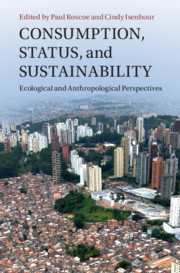Book contents
- Consumption, Status, and Sustainability
- New Directions In Sustainability And Society
- Consumption, Status, and Sustainability
- Copyright page
- Contents
- Figures
- Tables
- Contributors
- Preface
- 1 Standing Out, Fitting In, and the Consumption of the World
- Part I Status Competition and Hierarchy in Human Societies
- Part II Variability in Status Consumption
- Part III Continuity and Discontinuity
- Part IV Bending the Curve
- Index
- References
1 - Standing Out, Fitting In, and the Consumption of the World
Sustainable Consumption in a Status-Conscious World
Published online by Cambridge University Press: 30 July 2021
- Consumption, Status, and Sustainability
- New Directions In Sustainability And Society
- Consumption, Status, and Sustainability
- Copyright page
- Contents
- Figures
- Tables
- Contributors
- Preface
- 1 Standing Out, Fitting In, and the Consumption of the World
- Part I Status Competition and Hierarchy in Human Societies
- Part II Variability in Status Consumption
- Part III Continuity and Discontinuity
- Part IV Bending the Curve
- Index
- References
Summary
Status consumption is a major threat to environmental sustainability. In this volume, anthropologists and archaeologists explore the implications of status consumption for environmental sustainability across time and space as well as how the current destructive arc might be bent.
Keywords
- Type
- Chapter
- Information
- Consumption, Status, and SustainabilityEcological and Anthropological Perspectives, pp. 1 - 30Publisher: Cambridge University PressPrint publication year: 2021
References
- 1
- Cited by



